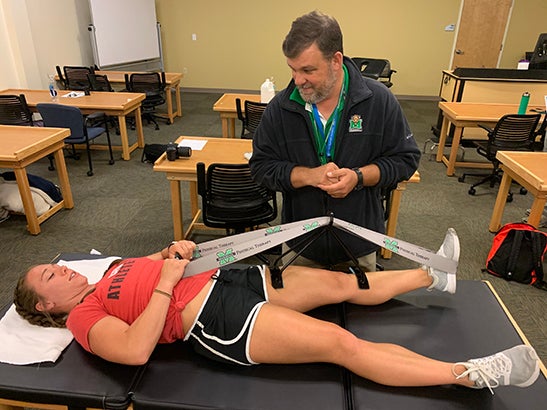LaunchIt, offered by UofL since 2011, is a 10-week program developed to help entrepreneurs and researchers gain a better understanding of the process for evaluating the commercial potential of their innovations and how to bring them to market. Participants like Profitt will work closely with experienced coaches.
While undergoing his own knee surgery, Profitt said he wanted to design a device that would allow him to regain full extension of his knee and normalize his walking quickly and correctly.
“Most everyone that has any type of knee surgery will need an outside force to help regain full extension, and this device is designed to do just that,” Profitt said. “Returning to a normal walking pattern is often the hardest thing to restore after a knee surgery. While I was in physical therapy for my own knee surgery, I had an idea to create a device that would be smaller, portable and less costly than what is currently available.”
Profitt said for now he’s referring to his invention as the KED, or Knee Extender Device, but said the official name would be determined by whomever licenses the patent. He said none of this would be possible without the support of the Technology Transfer Office at Marshall and RCBI. Through his work with RCBI the KED is now on version 5.0, what he thinks is the final prototype. He says they’re close to the production stage of the KED.
“I don’t think many of my faculty colleagues realize Marshall has resources like this to help us turn our ideas into reality. If we figure out a way to make things easier or more effective, Marshall is here to help get those concepts turned into tangible products,” Profitt said. “The ultimate goal is to get this device in the hands of patients for home use to promote carryover between their physical therapy visits.”
The 10-week LaunchIt program starts in Week 1 with exposure to key tools used in the commercial viability evaluation process, such as the Lean Canvas and Customer Discovery. During the program participants will validate the potential of their innovation and de-risk the commercialization process. In Week 10, participants will wrap up the program with an internal pitch event.
The Southeast XLerator Network is a group of research universities throughout the southeastern part of the United States and Puerto Rico, to which both Marshall and UofL belong. The institutions have joined forces to leverage an NIH STTR (National Institutes of Health Small Business Technology Transfer) award and the resources at each institution. This collaboration helps to develop and commercialize inventions in the health care industry from research at the institutions, creating a Regional Technology Transfer Accelerator Hub.
“We can greatly enhance our economic pipeline by connecting the brilliant, creative minds here at Marshall with resources to fill in the gaps between technology development and collaboration, funding, and commercialization,” said Amy Melton, assistant director of the Technology Transfer Office at Marshall. “I’d like to acknowledge UofL’s NSF I-Corps Site program, which provided the funding for Brad’s participation in LaunchIt, and the Southeast XLerator Network Accelerator Hub, which brings together the economic forces of these states and Puerto Rico by connecting network members to local resources like RCBI, our own subject-matter experts and local service providers.”
Marshall faculty, staff, and students are encouraged to contact the Marshall University Technology Transfer Office by e-mailing tto@marshall.edu to explore getting their ideas turned into a reality. RCBI (www.rcbi.org) is a great community resource for those with ideas and a desire to produce or manufacture items.
———–
Dr. Brad Profitt, assistant professor in the Marshall University School of Physical Therapy, has developed a therapeutic device used to regain knee extension after an injury or surgery. Profitt has a patent pending for his invention.

